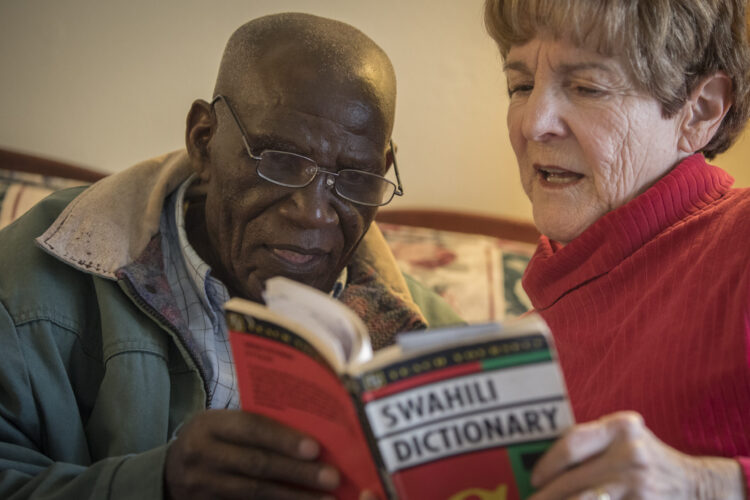Afghan, Honduran, South Sudanese families resettled in Weber County

Benjamin Zack, Standard-Examiner file photo
A pair of refugee families and a family of Afghan evacuees have resettled in Weber County, the first of an expected contingent to come here through 2022. In this archive photo from April 12, 2018, Segafuni Muhanuka, left, works on an English lesson with Kay Healey at Muhanuka's Ogden apartment. Muhanhuka and his wife are refugees from the Democratic Republic of Congo.OGDEN — The first three families expected as part of a new wave of international refugees and Afghan evacuees to Weber County have been resettled here.
They are part of a larger contingent of refugees and Afghans coming to Utah and the rest of the United States through the year. The two refugee families — from Honduras and South Sudan — are the first to be resettled in Weber County since the arrival of a group from the Democratic Republic of Congo in Africa in 2016, according to Aden Batar. He’s migration and refugee services director with Catholic Community Services of Utah, one of two agencies assisting with resettlement efforts in Utah.
“We’re doing all the basics right now,” Batar said. That is, CCS reps and volunteers are assisting the newcomers as they adjust to the area — helping enroll kids among the contingent in school, aiding them with the U.S. bureaucracy and assisting them as they grapple with the customs of a new country.
The Afghan family, which includes a U.S. citizen of Afghan descent, is part of the contingent that fled Afghanistan in the wake of the U.S. military departure from the nation last September. The refugee newcomers are part of the wave coming to the nation from refugee camps around the globe per the expansion of the U.S. refugee program under President Joe Biden.
A total of 917 Afghans have made it to Utah since the U.S. withdrawal, according to Asha Parekh, who heads the Utah Department of Workforce Services’ Refugee Services Office, overseeing the efforts. On top of that, an additional 160 refugees have been resettled here, she said, coming from Congo, Syria, Sudan, South Sudan and Iraq.
“Largely, they are settling in the Salt Lake Valley to be closest to resources and support, and about 19 are in Logan. A small number are also in Ogden,” Parekh said.
Utah will receive around 1,200 refugees in all through 2022 as part of the expansion of the U.S. refugee program, according to Parekh. Between Afghans and refugees, the Ogden area will receive around 15 families, Batar said.
“As always, it’s a difficult adjustment to begin to live in a new place, where refugees are often not familiar with the language, customs, culture and way of life. But they are adjusting over time and truly grateful for a place to call home, where they are generously welcomed,” Parekh said.
Jennifer Gnagey has assisted CCS with resettlement efforts in Weber County. Such initiatives are important as a way of aiding those most in need, she said.
“Refugees are effectively people without a country. They can’t return to their home county because they will face persecution or other risks to their livelihood,” she said. As a global leader, the United States, among other countries, has a responsibility “to give these people a place to call home.”
Batar didn’t have details of the Honduran and South Sudanese families in Weber County. Many flee Honduras, though, due to gang violence in the Central American nation.
South Sudan achieved independence in 2011 but subsequently descended into a civil war that killed 400,000, according to Reuters. Notwithstanding a peace deal, political uncertainty lingers on in the African nation.



